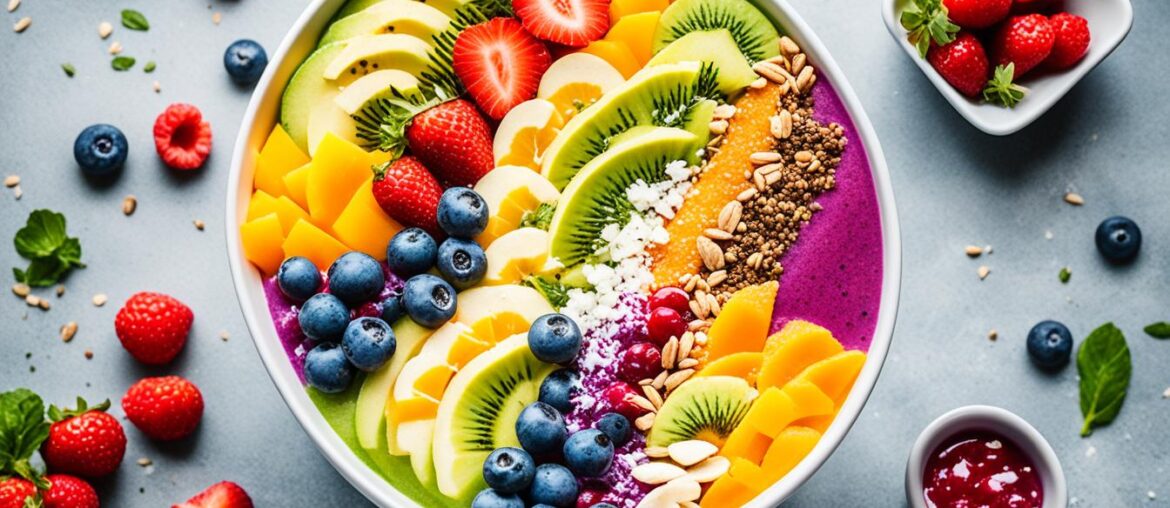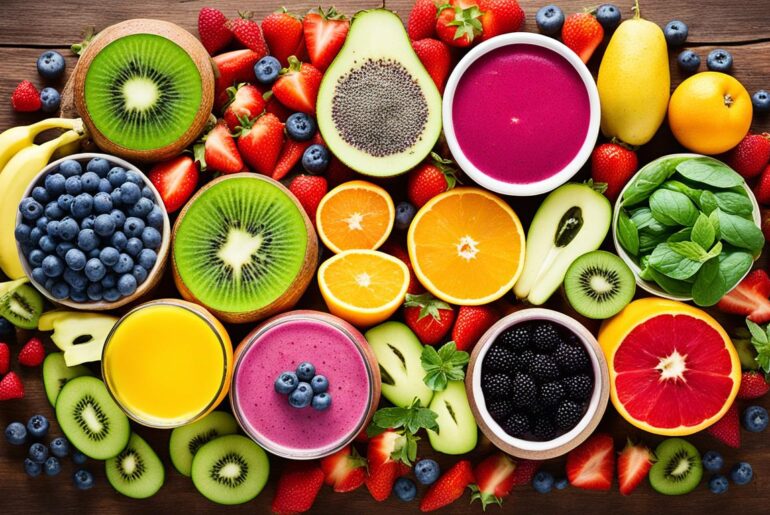Emotional eating can kick in because of stress, boredom, sadness, or anxiety. It affects many people, especially those on plans like The Smoothie Diet. Knowing the link between feelings and what we eat is key to sticking to a diet.
In this article, we’ll talk about the tough parts of emotional eating. We’ll share ways to beat it while on The Smoothie Diet. This diet helps us see food in a good light. It shows us how to manage our feelings through being mindful, taking care of ourselves, getting support, changing how we see food, and getting professional help when we need it.
Key Takeaways
- Emotional eating can be triggered by stress, boredom, sadness, or anxiety, impacting those on dietary programs like The Smoothie Diet.
- Building mindful awareness can help make more conscious food choices and reduce impulsive emotional eating behaviors.
- Engaging in alternative self-care activities such as meditation, journaling, or spending time with loved ones can decrease reliance on food for emotional comfort.
- A supportive environment, including friends, family, or online communities like The Smoothie Diet group, can significantly impact one’s ability to overcome emotional eating habits.
- Mindful eating practices, such as savoring each sip of a smoothie and paying attention to flavors and textures, can improve the relationship with food and reduce emotional eating tendencies.
Understanding Emotional Eating
Emotional eating means eating because of feelings, not hunger. People often choose high-calorie comfort foods when sad, stressed, or bored.
Stress sparks emotional eating for about 38% of adults. It’s a challenge for half of those trying to eat better, leading to unhealthy choices. It’s key to spot the reasons behind eating when not physically hungry to manage it well.
What is Emotional Eating?
It’s eating to deal with feelings, not because you’re hungry. People tackle loneliness with food, with 20% feeling food cravings when alone. This can make food that brings short-term comfort a habit.
Triggers and Patterns
Finding out what starts emotional eating is essential. Some common causes are:
- Stress makes about 38% of adults reach for food.
- Boredom leads to choosing less healthy snacks.
- Sadness often brings on a craving for sweet and fatty foods.
Knowing these patterns helps us eat more mindfully. For example, focusing on eating slowly decreases emotional eating by 25%. Also, getting help from a health coach or a therapist can cut down on these habits by 40%.
When we want to eat because we’re sad or stressed, the hunger starts in our minds. Real hunger, on the other hand, comes from the stomach, reminding us with growls or feeling faint. It’s important to tell the difference to beat emotional eating.
How Emotions Influence Eating Habits
Emotions have a big impact on what we eat and when. They can influence our diet in many ways. Stress and boredom are two emotions that can significantly change our eating patterns.
Stress and Eating
Stress often makes us seek comfort in food. Many find relief in high-calorie snacks when under stress. However, these choices only offer a brief escape. They don’t address the real emotional needs, causing a cycle of overeating. Eating for comfort usually isn’t because we’re physically hungry. It’s about wanting to feel better emotionally.
Boredom and Snacking
Boredom can lead to snacking, even when we’re not actually hungry. The food choices during these times are often less healthy. People tend to look for food that will quickly fill the boredom or make them feel better. When we’re bored, we might not find strict diets satisfying. This can drive us to crave more fulfilling, but often unhealthy, foods.

| Emotional Driver | Impact on Eating | Statistics |
|---|---|---|
| Stress | Leads to comfort eating, often high-calorie foods | 60% experience intensified emotional hunger |
| Boredom | Triggers snacking, usually less nutritious options | 70% report lack of satisfaction with restrictive diets |
| Emotional Hunger | Unrelated to physical need for food | 80% of episodes are not true hunger |
Understanding our emotional triggers can help us eat better. For many, emotional eating is about responding to feelings, not hunger. So, by acknowledging what really drives us to eat, we can start making healthier choices.
How The Smoothie Diet helps with emotional eating
The Smoothie Diet is a big help to deal with emotional eating. Swapping sugary, fatty snacks with nutrient-packed smoothies has changed my life. It helps me control my feelings better, so I don’t crave unhealthy foods as much.
Many people eat when they’re feeling down or stressed. Research says 38% of adults do this. The Smoothie Diet gives a healthy option for these tough moments. Choosing smoothies full of good stuff over junk food helps a lot.
The diet makes me more aware of what I’m eating. Studies say this can lower emotional eating by 30%. It turned eating into a mindful activity for me. So, instead of eating without thinking, I savor my smoothies and feel better.
Having support is key, too. Programs that help people stop emotional eating are 45% more successful when support is involved. Being part of a group or getting help from family makes a big difference.
Mindful eating and the right drinks cut down on binges by 25%. Thanks to these practices and nutrient-rich smoothies, I avoid unhealthy eating cycles. Sometimes, asking a professional for advice is really useful. It helps about 70% of the people who try.
COVID-19 made many Australians gain weight by eating more snacks and junk food. But The Smoothie Diet stands out. It’s not a quick fix that won’t last. It’s about finding balance for the long haul, helping us manage our feelings around food.
In short, the How The Smoothie Diet helps with emotional eating shows me eating smoothies is good for my mind and body. It takes away the worry and guilt we often feel with emotional eating. So, having smoothies daily has been a game-changer for me.
The Benefits of The Smoothie Diet for Emotional Health
The Smoothie Diet helps our emotions in big ways. It keeps our nutrition balanced and our mood steady. This diet also makes us want less junk food. In 2013, a big study showed that what we eat affects our health and happiness.

Nutritional Balance and Mood Stabilization
The Smoothie Diet is good at giving us all the nutrients we need. Studies show that eating foods rich in antioxidants lowers stress in our bodies. The EAT-lancet commission says eating balanced meals is key to feeling emotionally well.
Reduction in Cravings
The diet also cuts our desire for unhealthy snacks. Eating lots of fruits and veggies improves how our genes work against stress. Swapping two meals for smoothies makes us want to eat junk less, which helps keep our emotions balanced. Studies found that diets like this can even help with major depression.
The Smoothie Diet has worked well for me. It has improved my physical health and my mental connection with food. This, in turn, has helped me control my moods and cravings.
Managing Emotions with Smoothies
Stress makes us eat emotionally, which can lead to eating more and gaining weight. It happens because a hormone called cortisol makes us want sugary foods. These include pasta, bread, and desserts.
Drinking smoothies filled with fiber, protein, and good fats can help. They balance out our hunger and fullness hormones. This makes them a great choice for dealing with emotional eating.
Not getting enough sleep messes with our hunger and fullness hormones. This makes us eat more. Try to sleep seven to eight hours a night to avoid eating from boredom or emotions. Also, moving your body helps your body handle stress better and reduce cravings.
Eating a healthy diet is key. It’s not just good for your body, but for your mind too. Studies show that it can lower the chance of getting depressed. Eating foods like fatty acids, proteins, fibers, and vitamins B and D are especially important for your brain and gut. Bad diets are linked to worse mood conditions, like anxiety and depression.
Smoothies are good for stress eating too. They’re better than processed or fast foods. These foods might seem tempting when you’re stressed. Adding healthy fats from nuts, seeds, or avocados to your diet is also a good idea. They give you the calories and nutrients you need.
Eating smaller meals more often can also help curb emotional eating. Simple foods like puddings, oatmeal, or peanut butter can make you feel better. They help fight against the urge to stress eat. Planning your meals and making healthy options easy to get to is smart. It makes the smoothie diet for emotional health easier to follow.
Staying active is key for your mood and sleep. Researchers at the University of Virginia found a link between gut health and mental well-being. They discovered that a certain type of bacteria in fermented foods can affect our mood. Keeping our gut healthy is important for our emotional health.
Drinking smoothies that have fiber, protein, and good fats is part of a full plan. This plan includes sleep, exercise, and eating a variety of nutrients. Making smoothies a part of your daily diet helps with both your body and your mind. This makes the smoothie diet for emotional health a good and balanced choice.
Emotional Eating Solutions Provided by The Smoothie Diet
The Smoothie Diet offers helpful solutions for emotional eating. It helps you focus now, serving smoothies for your emotional and physical well-being. You’ll trade bad habits for mindful eating and healthful food choices.
Mindful Eating Practices
The Smoothie Diet highlights mindful eating to fight emotional eating. Being mindful means paying full attention to how food makes you feel. This can improve your food attitude and stop overeating caused by emotions. Enjoying your smoothie moment by moment helps manage your appetite and avoid eating in response to stress or boredom.
Healthy Alternatives to Comfort Foods
The diet also includes healthy alternatives to comfort foods. Instead of snacks high in calories, try nutrient-packed smoothies for both body and soul comfort. These smoothies are tasty and filling. They make staying away from unhealthy comfort foods a lot easier.

With these emotional eating solutions, you can learn better coping and emotional control. The Smoothie Diet helps fill you up in a good way. It makes eating a joyful, mindful experience. This method handles the emotional reasons behind overeating. It’s a step towards a healthier way of living.
Building a Supportive Environment
Creating a supportive environment is key. It helps maintain a smoothie diet and tackles emotional eating. Seeking support from friends and family is crucial. They offer encouragement and understanding when you need it most.

Joining a diet community helps a lot. It links you with others striving for similar goals. This community boosts your motivation and keeps you on track. Eating for emotional reasons is common. Many turn to food as a way to cope or for a quick pick-me-up.
Here are some steps to create a supportive setting:
- Identify emotional triggers: Figuring out what leads you to eat emotionally is a big first step.
- Communicate openly: Talking about your diet goals with loved ones helps create a supportive atmosphere.
- Engage in supportive groups: Being part of local or online groups offers ongoing encouragement and tips.
- Plan ahead: Have your smoothies ready to go, so you always have a healthy choice, especially when stress hits.
| Factors | Best Practices |
|---|---|
| Identify Triggers | Maintain a journal to track your feelings and eating activity. |
| Communicate | Discuss your plans with family and friends regularly. |
| Support Groups | Find and join groups or forums focused on The Smoothie Diet. |
| Preparation | Make smoothie batches in advance for quick and healthy choices. |
Building a supportive system is crucial while on a smoothie diet. It gives us the backing to combat emotional eating. Plus, it strengthens our resolve for sustained healthy eating habits over time.
Incorporating Emotional Self-Care
To manage emotional eating, it’s key to add emotional self-care to our daily lives. Focus on things that make you emotionally well. You’ll reduce wanting to eat for comfort. Here are some ways to do it:

Activities to Reduce Emotional Eating
Doing different things can cut down on emotional eating. It helps deal with the feelings behind eating. Try meditation, writing in a journal, or doing things you like.
They can give you other ways to deal with emotions. Always having easy meals ready can also make eating less stressful. This leads to better eating habits.
- Meditation: It calms the mind and body. This can make you less likely to eat when not hungry.
- Journaling: Writing your feelings helps you handle tough emotions. It’s a way to cope without eating.
- Hobbies: Doing things you love, like painting, takes your mind off food. It brings happiness without eating.
Finding Joy Beyond Food
It’s important to find happiness that doesn’t come from food. Mental and emotional health matter as much as healthy eating. Doing things that make you happy cuts down on using food for comfort.
Remember, it’s okay to enjoy eating. But, find happiness in other things, too. This makes how you eat healthier in many ways.
Mix up your meals, and add foods like berries and nuts for your brain. Balance your health with enjoyment in eating. Doing this helps with emotional eating, making you feel better all-around.
Transforming Emotional Eating Habits
To change emotional eating, embrace being aware and eating mindfully. This type of eating comes from feelings rather than hunger. It can cause overeating and bad health. Knowing why you eat can help stop this pattern and find better ways to cope.

Emotional eating often means we eat when we’re not truly hungry. This leads to eating food that gives a quick fix but is unhealthy. It starts a cycle of overeating and feeling bad. It’s not a good way to cope with emotions.
Eating a lot of food quickly, triggered by bad feelings, is called compulsive eating. It’s linked to binge eating disorder. Many think just trying hard not to eat will fix it, but the key is dealing with what makes us eat.
Studying “Journal of Behavioral Medicine” shows the good of eating mindfully. It helps eat less in binges. It is also good for losing weight and feeling better about eating. Being mindful can make us eat better.
Mindful eating can help with emotional eating if done right. It aids in eating for the right reasons, losing weight, and calming food worries. Keeping a food diary can show why we really eat. It’s a good step to eat better.
| Emotional Eating Aspect | Impact | Solution |
|---|---|---|
| Eating for Non-Hunger Reasons | Overeating and Health Concerns | Mindful Awareness |
| Emotional Triggers | Use of Food as Coping Mechanism | Mindful Eating Practices |
| Compulsive Eating | Overeating Without Awareness | Identifying Patterns |
| Binge Eating | Large Amount of Food in Short Time | Research-Based Strategies |
| Misconceptions | Belief in Willpower Alone | Comprehensive Approach |
To transform, we must work on knowing and handling our food triggers. This helps improve our weight and our feelings. We become healthier emotionally and how we deal with food and feelings.
Using The Smoothie Diet for Weight Loss and Emotional Health
The Smoothie Diet is great for losing weight and feeling better emotionally. It uses healthy foods and careful ways of eating. This helps with both slimming down and handling feelings.
Combining Nutrition and Mindfulness
It’s key to blend nutrition and being mindful in The Smoothie Diet. You trade two meals each day for a packed smoothie. This smoothie has fruits, veggies, proteins, and good fats. It keeps you full of what you need.
Your third meal lets you choose what to eat. This makes sticking to the diet easier.
Being careful during meals is big. It lets you spot what makes you eat when you’re not hungry. The 21-day plan helps you get healthy and stay that way. It mixes smart eating with being aware.
Long-term Benefits
The Smoothie Diet brings lots of good that lasts. People often drop 3 to 12 pounds quickly. This early win helps keep them making good food picks for a long time.
It also helps keep you up and sharp. The smoothies are full of stuff that keeps you from snacking too much. They help keep your blood sugar steady. Plus, you can mix them to fit just what you need.
The benefits last well past the three weeks. It teaches you smart ways to eat. This sets you up for feeling good in your body and mind for a long time. The diet is more than just a plan; it’s about changing how you live for the better.
Rebuilding Food Associations
Changing how we see food is key in managing emotional eating. If we look at food as more than comfort, we can make better choices. The Smoothie Diet helps by promoting smoothies packed with nutrients. This way, we focus on health benefits instead of just feeling better.
We often link specific foods to our emotions. For example, we might eat sweets when we’re sad. This can make us keep turning to them for comfort.
Eating a varied meal a few hours before active times, like dancing, can really boost energy. Snacking on carbs right before can help too. These steps will help your body work better and need less unhealthy snacks.
It’s important to steer clear of certain foods before activities to avoid tummy troubles. Choose fruits and foods rich in omega-3s, like salmon and walnuts, for after.
If you’re on a special diet, supplements can ensure you get all you need. They’re great for those with food allergies too.
Drinking enough water is vital, especially when active. Everyone needs different amounts of fluids. Try to drink plenty all the time. Calcium and vitamin D keep your bones strong, while iron helps your muscles work better.
Switching to healthier foods like whole grains and vegetables can keep you going strong. Having snacks during long activities will stop you from picking unhealthy comfort foods.
Seeking Professional Support for Emotional Eating
For those struggling with emotional eating, getting professional help is key. Dietitians, counselors, or therapists offer special help to handle this complex issue.
Seeking this support is important and sometimes a must. Emotional eating can cause big health problems like obesity, diabetes, and more. Binge eating is even seen as a mental health issue. Getting better often needs experts, not just trying on your own.
Life events and daily stress can make emotional eating harder to stop. A dietitian or therapist can teach you ways to cope without turning to food. They also help change negative thoughts into healthier actions. Plus, they might suggest smoothies to manage emotions better, adding them to a healthy plan.
So, reaching out for help with emotional eating is a big step toward wellness. It’s about ending the cycle of using food to cope. This way, you can enjoy food without it controlling your emotions, leading to a better life.
Conclusion
The Smoothie Diet is more than just a diet. It focuses on health and well-being. It shows that what we eat affects how we feel. This diet helps tackle eating due to emotions like stress, boredom, or sadness. By recognizing these feelings, we can start eating better.
What makes The Smoothie Diet special? It uses ingredients that boost our mood. These include bananas, berries, and dark chocolate. These smoothies are rich in nutrients. They help keep our blood sugar steady and our mood stable. They also make our gut healthy. This means we feel less anxious and think better.
Antioxidants from the smoothies are great for the brain. They fight against things that harm our brain. Drinking smoothies also keeps us hydrated. This helps our brain work well. By being aware of what we eat, we can feel happier and calm. This diet is a good way to heal our relationship with food and feelings.




